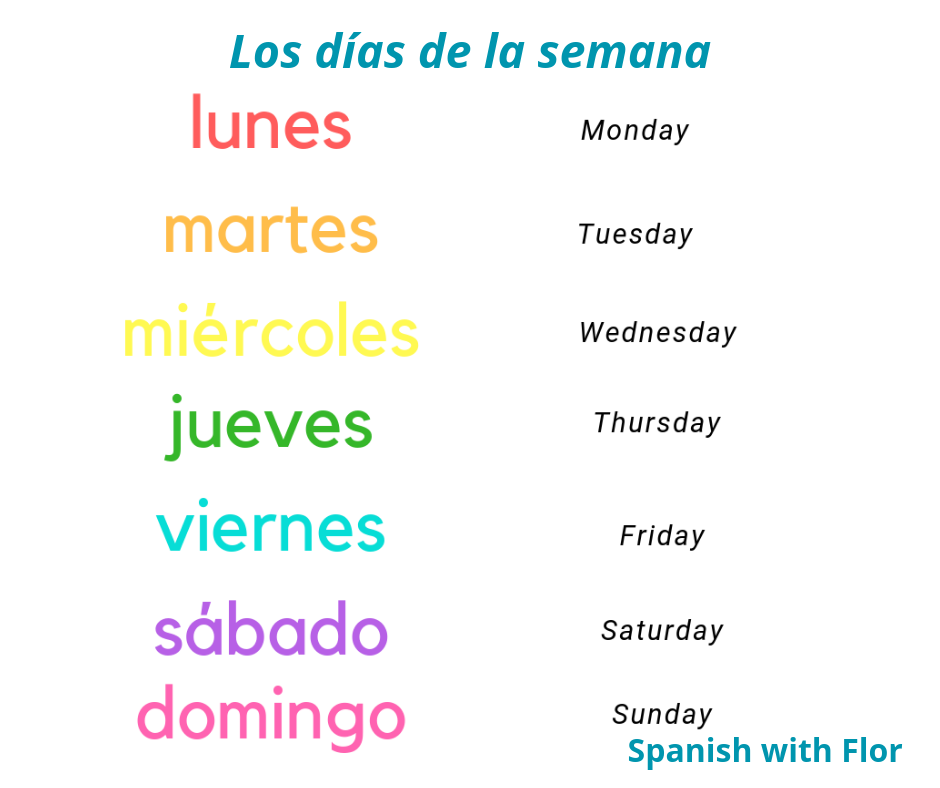Learning the days of the week in Spanish is one the first things you learn in any Spanish course. Once you have learned the days, you can start using them in expressions and phrases to communicate more effectively in Spanish. Here are some examples:
- Hoy es lunes. (Today is Monday.)
- Mañana es martes. (Tomorrow is Tuesday.)
- Pasado mañana es miércoles. (The day after tomorrow is Wednesday.)
- Ayer fue domingo. (Yesterday was Sunday.)
- Todos los días son importantes. (Every day is important.)
In Spanish, the days of the week are not capitalized, unlike in English. Also, the definite article “el” is used before the day of the week, except when talking about activities that happen regularly on a particular day. For example:
- Los lunes voy al gimnasio. (On Mondays, I go to the gym.)
- Los sábados salgo con mis amigos. (On Saturdays, I go out with my friends.)
- Los domingos voy a misa. (On Sundays, I go to church.)
In addition, when talking about a day of the week in the past, the word “pasado” is used, and when talking about a day of the week in the future, the word “próximo” is used. For example:
- El lunes pasado fui al cine. (Last Monday, I went to the cinema.)
- El miércoles próximo tengo una reunión. (Next Wednesday, I have a meeting.)
Once you have learned the days of the week in Spanish, you can start using them in expressions and phrases to communicate more effectively. Remember to use the definite article “el” before the day of the week, and to use “pasado” for the past and “próximo” for the future.

Grammar Rules for Days of the Week in Spanish
When learning Spanish, it’s important to understand the grammar rules for days of the week. Here are some key points to keep in mind:
Why are the days of the week lowercase in Spanish?
Unless capitalization is mandatory for punctuation (at the beginning of a text or after a period), the names of days of the week, months and seasons of the year are written in Spanish with initial lowercase, some examples:
- Nació el pasado martes, 22 de noviembre.
- En Caracas, a 6 de mayo de 2005.
- Esta primavera ha llovido mucho.
They only begin with a capital letter when they are part of names that require their elements to be written with an initial capital letter, as is the case with the names of festivities, dates or historical events, urban roads, buildings, etc., here are some examples:
- Viernes Santo
- Primavera de Praga
- plaza del Dos de Mayo
- Hospital Doce de Octubre
Prepositions for Days of the Week in Spanish
When talking about days of the week in Spanish, you can use the following prepositions in these situations:
| Preposition | English |
| HASTA – It indicates the final limit of a specified course in time. Trabajan hasta el sábado. | They work until Saturday. |
| DESDE – It indicates the point in time from which a thing, a fact, begins. Desde el lunes que no he visto a Marisa. | I haven’t seen Marisa since Monday. |
| DE – A – It indicates the point from which something starts. La tienda está abierta de martes a domingos. | The store is open from Tuesday to Sunday. |
| PARA – To indicate the time at which it is decided to finish something Necesito terminar el proyecto para el miércoles. | I need to finish the project by Wednesday. |
Plural forms for the days of the week in Spanish
The first five days of the week remain invariable in the plural: los lunes, los martes, los miércoles, los jueves, los viernes. The only two days of the week that change in the plural form are “sábado” and “domingo.” They become “sábados” and “domingos,” respectively.
Pronunciation
Here are the correct pronunciations for the days of the week in Spanish:
- lunes: LOO-ness
- martes: MAR-tace
- miércoles: mee-EHR-coh-less
- jueves: HWEH-bace
- viernes: bee-EHR-ness
- sábado: SAH-bah-doh
- domingo: doh-MEEN-goh
Are Spanish days of the week masculine or feminine?
All days of the week in Spanish are masculine. This means that when you use them in a sentence, you should use masculine articles and adjectives. For example, “el lunes” (the Monday) and “un martes ocupado” (a busy Tuesday).
Use of ‘día’ with weekdays in Spanish
In American Spanish it is quite common for the days of the week to appear after the word día, a normal usage in medieval and classical Spanish, of which there are also traces in some areas of Spain. For example, “el día lunes” (the day Monday).
Do you use articles with days of the week in Spanish?
When talking about days of the week in general, you need to use the definite article “el” before the day. For example:
- “Tengo clases de guitarra los martes” (I have guitar lessons on Tuesdays)
- “Voy a la playa los domingos” (I go to the beach on Sundays)
- “El jueves tengo una entrevista “– (I have an interview on Thursday)
- “¿Qué planes tienes para el sábado?” – What plans do you have for Saturday?)
Remembering these grammar rules will help you speak Spanish more fluently and accurately.
Origins of Spanish Days of the Week Names
If you’re learning Spanish, you’ll need to know the days of the week to be able to schedule appointments, make plans, and talk about your routine. The Spanish language, like many others, has its own unique names for the days of the week. Let’s take a look at the origins of these names.
Etymology of the days in Spanish
Most of the Spanish days of the week are named after heavenly bodies, which are of Greco-Roman etymology. The historical origin of the days of the week can be linked to Roman mythology. The Romans saw a connection between their gods and the night sky, which would change according to the days. In the same way, they started to use the names of their gods for the planets.
Spanish Days of the Week
Here are the Spanish names for the days of the week, along with their English translations:
- Monday: lunes (Moon Day)
- Tuesday: martes (Mars Day)
- Wednesday: miércoles (Mercury Day)
- Thursday: jueves (Jupiter Day)
- Friday: viernes (Venus Day)
- Saturday: sábado (Sabbath Day)
- Sunday: domingo (Lord’s Day)
Learning the days of the week in Spanish is an essential part of mastering the language. Once you have a good grasp of the names and their origins, you’ll be able to talk about your schedule and make plans with confidence.
How do you remember the days in Spanish?
Learning the days of the week in Spanish is an important aspect of mastering the language. Here are some tips to help you memorize and practice the days of the week:
- Start with the basics: The days of the week in Spanish are called “días de la semana.” They are masculine nouns, which means that they use masculine articles such as “el” instead of “la.”
Learn the pronunciation: Spanish pronunciation is different from English, so it’s important to practice saying the days of the week out loud. For example, “lunes” is pronounced “loo-ness,” “martes” is pronounced “mar-tace,” and “miércoles” is pronounced “mee-air-coh-less.”
Use mnemonics: Mnemonics can be a great tool for memorization. For example, you can remember that “miércoles” means Wednesday by thinking of it as “midweek.”
Practice with flashcards: Flashcards are a great way to practice memorization. You can create your own flashcards or use online resources to help you practice.
Read articles: Reading articles in Spanish can help you encounter the days of the week in context. This can help you remember them better and understand how they are used in everyday conversation.
Make it fun: Learning a language can be challenging, but it can also be fun! Try to find ways to make practicing the days of the week enjoyable. For example, you can make a game out of it with friends or family.
By following these tips, you can improve your ability to pronounce and remember the days of the week in Spanish. With practice and dedication, you’ll be able to use them confidently in everyday conversation.
Days of the week Spanish Practise
Days in Spanish Spelling Exercise
Months of the Year in Spanish Exercises
If you are looking to start your Spanish learning, I can help you!
Join the Spanish with Flor Basic Spanish Course where I will teach you all the basics to kickstart your Spanish!







